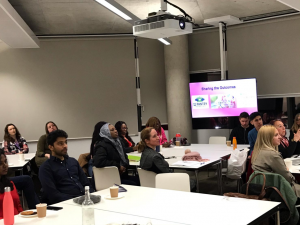Well, what a week! Lockdown hasn’t reduced the volume of content, analysis and comment out there (although there is a bit of a theme). Welcome to your fully stuffed policy update which contains more goodies than the average panic buyer’s larder (we know, that is such an outdated concept already). Exams, grades and admissions remain a key focus for the sector, Parliament plan to embrace virtual working, there are some fab opportunities for researchers and we’ve a new Labour leader and Shadow Cabinet.
Good news
One good thing to come out of all this is that the role that universities can play in contributing to wider societal issues is being highlighted – not that it will make much difference to perceptions long term, but it’s nice to share good news. Take a look at the UUK website for more information on their #wearetogether campaign. There’s more on the BU website about our own efforts, and the BU news team are looking for more stories so let them know what you are up to.
Parliamentary Business
Virtual Parliament – There is a push for Parliament to operate virtually in a formal capacity during the Coronavirus lockdown. This is challenging because, as we mentioned in the policy update two weeks ago, Parliament has terrible facilities for this. However, Labour’s shadow minister for innovation, Chi Onwurah, sums it up: “People up and down the country have made huge behavioural changes in a matter of days and we must show we are capable of it too”.
Commons Speaker Lindsay Hoyle and Commons Leader Jacob Rees-Mogg have both given their backing to the virtual Parliament proposals from 21 April (the end of recess). The plan is for certain types of important business to be conducted virtually. Lindsay Hoyle writes:
- Parliament’s role of scrutinising government, authorising spending and making laws must be fulfilled and in these unprecedented times that means considering every technological solution available. We are exploring options with the parliamentary authorities in readiness for parliament’s return… Once the house returns, if we are still in the grip of the crisis where the physical presence of members, or too many members, in the palace is not appropriate, I am keen that they should be able to participate in key parliamentary proceedings virtually, for example oral questions, urgent questions, statements.
Some select Committees are already operating virtually (you can read the key points from the Education Committee’s session later in this policy update).
In addition, the Speaker is urging the Government to set up a forum of Ministers and senior Government representatives during recess for MPs to ask questions at set times on different days ‘about how things work and how they can be improved’. Hoyle writes: MPs are being swamped right now with questions and case work from distressed constituents who need answers…Responses cannot wait for the House to sit again.
Acting leader of the Liberal Democrats Ed Davey is calling for a specialist select committee focusing on Covid-19. He stated:
- If it wasn’t a dangerous infectious virus but a major emergency, parliament would have been recalled. We wouldn’t have gone on recess. …We think scrutiny is good for government policy. We’ve shown opposition parties are prepared to behave responsibly. I think we can find a way to get things cracking and get an online virtual parliament to serve the nation.
The Guardian report on the virtual parliament here.
PM powers – ICYMI Prime Minister Boris is in hospital and has designated Dominic Raab (Foreign Secretary and First Secretary of State) to deputise “where necessary”. The UK’s unwritten constitution does not provide a clear outline of what the situation now allows, but as Cabinet takes collective decisions it is understood that Raab will be the first amongst equals. It is unlikely Raab will be afforded the prerogative powers of the Prime Minister, such as the ability to conduct reshuffles or take significant security decisions. However, there isn’t a clear outline of Raab’s new responsibilities nor the limits he has been given by the Government. The decision on whether or not to extend or end the lockdown is due to be taken next week, but it is likely this will be deferred or made by Cabinet collectively if the Prime Minister is incapacitated. In extreme circumstances, it would be expected that the Queen would ask Raab to form a government on a permanent or interim basis.
On Raab Dr Catherine Haddon, from the Institute for Government, said the situation remains uncertain and that some powers could be distributed to a number of Cabinet ministers – “the power would derive from the prime minister saying who he wants ministries to respond to“.
Labour Leader & Shadow Cabinet – Keir Starmer was elected the leader of the Labour Party in the first round, of voting. He won 56.2% of first preference vote (more actual votes than Jeremy Corbyn in 2015, although a smaller overall percentage of the total). He also won the majority of votes across all three groups – MPs, affiliates and party members. Rebecca Long-Bailey took 27.6% of the vote share and Lisa Nandy 16.2%. On Keir Research Professional say: His grass-roots mandate is significant—and is coupled with a shift away from Corbyn loyalists on the party’s national executive committee.
The new leader pledged to work constructively with the Government whilst holding them to account:
- Under my leadership we will engage constructively with the government, not opposition for opposition’s sake. Not scoring party political points or making impossible demands. But with the courage to support where that’s the right thing to do…We will shine a torch on critical issues and where we see mistakes or faltering government or things not happening as quickly as they should we’ll challenge that and call that out.
Here is the full Shadow Cabinet Line up:
- Leader of the Opposition: Keir Starmer
- Deputy Leader and Chair of the Labour Party: Angela Rayner, elected in the third round of voting with 52.6% of the vote.
- Shadow Chancellor: Anneliese Dodds
- Shadow Education: Rebecca Long-Bailey
- Shadow Home Secretary: Nick Thomas-Symonds
- Shadow Secretary of State for Health and Social Care: Jonathan Ashworth (incumbent)
- Shadow Foreign Secretary: Lisa Nandy
- Shadow Chancellor of the Duchy of Lancaster: Rachel Reeves
- Chief Whip: Nick Brown
- Shadow Justice: David Lammy
- Shadow Defence: John Healey
- Shadow Business, Energy & Industrial Strategy: Ed Miliband
- Shadow International Trade: Emily Thornberry
- Shadow Work and Pensions: Jonathan Reynolds
- Shadow Digital, Culture, Media and Sport: Jo Stevens
- Shadow Chief Secretary to the Treasury: Bridget Philipson
- Shadow DEFRA (Environment, Food & Rural Affairs): Luke Pollard
- Shadow Communities and Local Government: Steve Reed
- Shadow Housing: Thangam Debbonaire
- Shadow Transport: Jim McMahon
- Shadow International Development: Preet Kaur Gill
- Shadow Women and Equalities: Marsha de Cordova
- Shadow Employment Rights and Protections Secretary: Andy McDonald
- Shadow Minister for Mental Health: Rosena Allin-Khan
- Shadow Minister for Young People and Voter Engagement: Cat Smith
- Shadow Attorney General: Lord Falconer
- Shadow Leader of the House: Valerie Vaz
- Shadow Northern Ireland (interim): Louise Haigh
- Shadow Scotland: Ian Murray
- Shadow Wales: Nia Griffith Shadow
- Leader of the Lords: Baroness Angela Smith (incumbent)
- Lords’ Opposition Chief Whip: Lord McAvoy
Shadow Secretary of State for Education – Rebecca Long Bailey has the Shadow Secretary of State for Education brief replacing Angela Rayner. Rebecca has held Shadow Ministerial posts for almost all of her parliamentary tenure. This gives us little evidence from which to judge her opinions and intents for Education. Dods have pulled together snippets from her parliamentary career when she has spoken out on Education matters.
Universities: That brings me to local industrial policy. Labour has been clear on the need for a national industrial strategy, but we are also clear about the need to be regionally powerful and distinctive, with the resources to match, and to build on the already world-class universities and businesses in our regions and nations (2018)
Further Education: Businesses also need a highly skilled workforce, but the Government have cut real-terms school funding, scrapped the education maintenance allowance and imposed huge cuts to further education funding over the past seven years (2017)
Schools: We have rampant regional inequality, hunger in schools and public services pushed to breaking point by a policy that even the Chancellor now admits was a political choice all along—the choice of austerity (2020)
Technical and Adult Education: Key policies include establishing a technical education system, investing £406 million in maths, digital and technical education, and creating a national retraining scheme with an investment of £64 million. Again, the intent is good, but let us remember that the Government cut £1.15 billion from the adult skills budget from 2010 to 2015. Similarly, on first analysis the £406 million appears to be the sum of the amounts the Government have already spent on maths, computing and digital skills (2017 budget debate)
T levels: Some of the Government’s commitments are welcome, including the national retraining scheme and the T-levels that she has just mentioned, but sadly they are meaningless in the context of the cuts that we have faced over recent years (2018)
Research Professional have this to say on Rebecca’s expected approach to the universities brief:
- …for the foreseeable future Long-Bailey will double down on the Corbynite legacy of the National Education Service. Starmer committed during the election campaign to retaining the party’s pledge on the abolition of university tuition fees.
- With Angela Rayner—former shadow education secretary—as chair of the Labour Party and now having a considerable say in policy formation, the National Education Service is probably safe for now. The problem with it as a policy is that it manages to be simultaneously expensive and vague, without cutting through to the public.
- The appointment of Long-Bailey as shadow education spokesperson is perhaps indicative of how Starmer views the brief. It is not a priority for now and is a safe holding pen for the thwarted aspirations of those still loyal to the Corbyn project.
- Long-Bailey will find an appreciative audience among many within the University and College Union, which Corbyn’s Labour Party leaned on heavily to outsource thinking about universities. However, others in the union will regret that the choice of shadow education secretary will make it harder, not easier, to move on from past impasses.
- Playbook would be very surprised if Long-Bailey made it to the next election still in the education role. It is standard practice for a party leader to appoint their recent rivals to sit around their first cabinet table, only to rotate them out in the fullness of time.
HE Connections – Labour does have substantial academic and HE connections within its elected representatives. The shadow chancellor, Anneliese Dodds, was a lecturer in public policy at King’s College London and Aston University before becoming an MP. Shadow Home Secretary, Nick Thomas-Symonds, was a history and politics lecturer at Oxford. Rupa Huq was a lecturer at Kingston University. Shadow Justice Secretary, David Lammy, was the Universities Minister under Gordon Brown’s Government. Robert Zeichner, who doesn’t have a ministerial brief in the reshuffle, is the Chair of the All-Party Parliamentary Group for Universities. Lastly, Paul Blomfield worked with then Universities Minister Jo Johnson to amend the post-work visa system for international students.
Exams, Grades & Admissions
GCSE & A Level – The Government released their grading system for GCSE and A level exams at the end of last week. Alistair Jarvis, UUK Chief Executive, commented:
- No aspiring student should be disadvantaged because of the current Covid-19 outbreak and this is welcome progress towards ensuring students and universities alike can take confidence in the way A-levels are awarded this year. It is clear that a robust process will be in place that takes account of a wide range of information about a student and their performance throughout the course of their current study, and that standardised judgements and an agreed methodology will ensure consistency and fairness. We are committed to supporting Ofqual as they continue to develop their precise methodology.
- To provide additional reassurance to students, it is important to note that universities will also have the power to be flexible in taking an applicants’ context into account as part of the admissions process.
On students dissatisfied with their grades who will opt to take the autumn exam Independent Schools Council Chairman, Barnaby Lenon, said: We hope that universities will show flexibility to ensure that students who take this option are able to begin their course with a delayed start time.
Clare Marchant, UCAS’ Chief Executive, said:
- It’s essential for their future education and careers that students receive a set of fair and justifiable examination results. The processes outlined by Ofqual today will do exactly that. The best available evidence in the extraordinary circumstances we are all in will be used to calculate regulated grades that will stay with students for years to come. For those applying to higher education, we expect them to be treated fairly and consistently, and universities and colleges to consider these grades in the same way as any qualifications from previous years.
On Tuesday Wonkhe reported that A poll by the Student Room found that nearly two-thirds of GCSE and A level students in the 700-person sample answered “no” to the question “Do you think you will be given a fair grade this summer?”. Tes has the story.
Wonkhe discuss HE uncertainties for admissions colleagues from the proposed grading:
- we don’t know when the 2020 A level results will be available, which is a big deal for universities and those applying to them. This year’s grades will be predicted by teachers and normalised by a nationally applied formula – meaning that taken together, results will look very similar to those from previous years. While this feels fair, there are risks that high-achieving students in historically low-achieving schools may be disadvantaged.
- A level grades are predicted every year, of course, as a part of the UCAS application process. We are familiar with the weaknesses of those predictions and, in many ways, compensate with these in offer-making and admissions behaviour. With offer-making still furloughed for the time being, it remains to be seen if these same mitigations will work against newer, normalised, predications as the end point – or how many students will want to take the opportunity to sit an exam later in the year.
- Universities will understandably want to think through how to proceed with admissions in the way that supports good decision making, and is as fair as possible.
The blog We can make admissions work without A levels explores:
- a model that dataHE has developed to support admissions on the basis of predicted grades. Though predicted grades are less accurate than exam results, this matters less this year, because there won’t be any exam results. Importantly, since predicted grades were assigned before exams were cancelled, they have roughly the same amount of bias baked in as in any normal year. That makes it possible to use them – carefully, and in an evidenced way – to build a model of exam-awarded grades on which to base admissions decisions.
Wonkhe’s data expert David Kernohan has a blog setting the current situation in context with the wider practice of predicting grades.
And there is another on Changing student recruitment in light of Covid-19.
HE Exams – Wonkhe report that QAA will publish new guidance this week:
- on academic standards and student achievement alongside a section on practice and lab-based assessment during the Covid-19 crisis. These materials offer examples from providers around the sector alongside principles-based planning – there are detailed proposals for digital assessment alongside suggestions for student support.
- The general guidance covers modifications to academic regulations (emergency academic regulations), gathering details of local circumstances from students and applying mitigations accordingly, arrangements for progression with reduced academic credit (apparently OfS guidance is on the way here), and assessment boards.
As many universities have already worked out, or made good progress in working out what they are going to do in this area, this is a bit late, really.
There is also a blog by Douglas Blackstock, Chief Executive of QAA, on Wonkhe describing how QAA is helping universities and PSRBs (Professional, Statutory and Regulatory Bodies) accredit students as meeting the requirements to practice within their field.
Surveys – It was inevitable that potential HE students would be surveyed to death and asked about their concerns and whether they intend to continue with their plans to commence HE. The UCAS poll (sample size – 500 students) states the 86% intend to continue on to HE despite the pandemic disruption. 60% have selected their first choice place. 27% are waiting before they confirm their firm choice of institution. UCAS also report that over half (51%) of respondents feel supported at the moment, but want more help. While 37% said felt fully supported now, this is higher amongst white applicants (40%) and lower amongst BAME applicants (29%).
Research Professional (RP) cover the survey and mention the uncertainty surrounding when the next academic year will commence. Humorously, RP remind us that After months cooped up at home with their parents, it’s understandable—and their hopes [to attend HE] might be the only thing keeping us all going.
TES also cover the UCAS poll results.
HEPI have a wider poll, we’ve covered this separately below due to the volume of detail. However, they find that a third of applicants feel less confident they will get into their chosen university since the pandemic.
The Times reports on a QS survey in Universities face crushing blow as overseas students stay away. QS surveyed 11,000 prospective international students (only 4,600 intended to study in UK). 55% stated their plans to commence study in the UK in September 2020 had changed. 32% were still deciding and 14% were determined to go ahead despite disruption and potentially online learning. The Times article states: Our higher education sector will be crucial to the post-crisis recovery, so it is vital that the UK remains a welcoming place for people from across the world, including from China.
International Admissions – HESA released HE sector finance data on Friday and Wonkhe have produced a series of tableau tables showing where institutions sit against the variables. There is an interesting table highlighting the providers with the highest international student incomes (those who may be hit hardest if the predicted downturn in international students for September 2020 intake is realised). Predictably UCL and other London institutions congregate at the top. However, the table can be filtered down to other regions and exclude PG or UG or full/part time provision. You may also be interested in the key financial indicators table, again filterable by different measures of financial health and stability.
The Times and the Telegraph also cover the data release.
Unconditional Offers – Moratorium Extended
Universities Minister Michelle Donelan has extended the moratorium preventing universities from making unconditional offers until 20 April.
Research Professional (RP) say: The Department for Education seems to have rejected the argument that making unconditional offers to prospective students following the cancellation of A levels would be in the interest of stressed and concerned applicants.
RP report in the same piece that Donelan states: I know many students will be anxious at this unprecedented time and worried about what it means for their future..My top priorities are to both reassure students and protect our world-leading higher education sector. That is why I am calling for an extension to the pause on changes to university offers, and I urge universities to adhere to this so we ensure long-term stability across the admissions system.
The OfS are supporting the Minister by exploring the use of regulatory powers to take enforcement action against universities and colleges not acting in the best interests of students or undermining the stability and integrity of the higher education sector—including – considering options for enforcement during the moratorium period. And: Universities and colleges must also ensure that their admissions processes work effectively to identify applicants with the potential to succeed, particularly where those applicants have experienced barriers and disruption on their route to higher education.
RP conclude: The Department for Education has been rattling its sabre over admissions and the regulator has threatened fines. But autonomous university admissions are guaranteed by the Higher Education and Research Act 2017. When push comes to shove, the government might find that there is not much more it can do beyond expressing censure.
Fighting talk certainly, but a later RP blog with content from HE Legal expert Smita Jamdar and Nick Hillman (HEPI) considers the grey areas. The blog is well worth the quick read.
The Times has a related article: Fines for universities using low offers to ‘poach’ students from rivals. In the article they report the OfS as stating it would be looking closely at the financial stability of universities over the next few weeks: “Clearly coronavirus will have a significant impact on universities. One of our main areas of focus in the coming months will be to support the financial sustainability of the higher education sector in England.”
RP were quick to point out The Office for Students has always insisted that it will not bail out universities that are failing. The next few years could test that to the limit. There is also a RP piece on the reduced regulatory load the OfS is requiring of HE institutions during the current crisis: OfS freezes normal regulatory requirements during pandemic and here are the details of the suspended requirements from the OfS website.
OfS
The OfS has been busy. First, they supported the Minister in the extension of the moratorium (above) and pledged to crack down on any wizard wheezes that universities had found around the request. They’ve also reduced the standard regulatory requirements so universities can focus on the most pressing operational issues caused by C-19.
Next they issued guidance for universities on quality and standards of learning and academic assessment during the pandemic. And accompanied it by an introductory descriptive blog: Maintain good courses and credible qualifications for students during pandemic, says regulator urging flexibility, reasonable adjustments, teaching and support on a relative par to ‘normal’, clear communications to students to keep them informed and setting out what the OfS considers examples of effective practice from across the higher education sector.
HEPI Student Survey
HEPI polled 1,000 full-time UG students and 500 HE applicants to explore how the Covid-19 pandemic is affecting them.
Current Students on Assessment
- 70% of students feel the messaging from their HEI on Coronavirus has been either ‘clear’ or ‘very clear’
- 36% think the current crisis should lead to their assessments for the rest of the year being cancelled
- 42% expect universities to continue assessments online but 17% would prefer for the assessments to be postponed until after the crisis.
- A greater proportion of first year students (44%) thought assessments should be cancelled, compared to second year students (32%) or students in their third year (31%).
- Just under half of students (49%) are satisfied with the online learning that has replaced their face-to-face teaching; 23% of students are dissatisfied.
- The majority (55%) of students are living away from their normal term-time residence as a result of the Coronavirus crisis. However, another 45% of respondents said they are still living in their term-time residence.
Applicants
- 29% of applicants are concerned about whether they’ll get a place at their chosen university (the overall picture is interesting – see later chart).
- 46% expect their predicted grades to reflect their final grade, whereas 27% think their predicted grades are worse than their final grades would have been.
- 79% of applicants stated the pandemic has not had any impact on which university will be their first choice. Only 7% plan to change their first-choice university and another 14% are undecided.
- 53% of applicants feel the messaging they have received on Coronavirus from their prospective universities has been clear.
Rachel Hewitt, Director of Policy and Advocacy at the Higher Education Policy Institute, said:
- These results show universities are supporting students and applicants well through these challenging times. Despite having to scale up online provision very quickly, few students are dissatisfied with the offering from their institution. Both applicants and students feel they have had clear information around the pandemic. On admissions, it is clear applicants need greater certainty about what will happen to their university places. It is essential this group, who have already lost out on the end of their school experience, are not disadvantaged from getting into the university of their choice. The data shows this is a concern for a significant minority of applicants. Despite all the uncertainty, much remains the same. Two-thirds of students still want the opportunity to complete their assessments from afar. The majority of applicants still intend to go to the same university as before the crisis. What’s more, many students are still living in their term-time residence, meaning they may be reliant on the support of their university and accommodation providers.
Dods say:
- Whilst the poll suggests that the pandemic has had a limited impact on students consideration of their first choice institution, there is concern that the combination of cancelled exams, the absence of university open days and the potential that the UK could still be moving in and out of phased social distancing measures, could have an impact on the number of students choosing to defer their entry to higher education by twelve months. For universities, the financial impact of a decline in international students, coupled with the cancellation of potentially lucrative conferencing opportunities over the summer, could be further exacerbated by a fall in domestic uptake. Given the lack of control over how students are distributed across institutions and subjects, a decline could result in some providers significantly under recruiting. As such, calls have emerged for the Government to mitigate against volatility in the market by exercising control over student numbers. This could be achieved via statutory instrument under the emergency Coronavirus Bill.
Education Committee – Disadvantage
The Education Committee has published a summary of their 25 March private meeting (with the DfE as part of the inquiry investigating the impact of COVID-19 on education and children’s services). The meeting tackled the impact of school closures on the attainment gap between disadvantaged pupils and their wealthier peers.
- DfE expects schools to do all they can to ensure lessons continue online or via other means, and that learning should continue. Schools to remain open for the most vulnerable but acknowledged that the effect of school closures on vulnerable and disadvantaged pupils was a concern.
- DfE expect the system to act flexibly to support vulnerable children. Local Authorities should work with schools and the sector to ensure children with an education, health and care (EHC) plan or social worker are supported and there is appropriate oversight of children remaining at home.
- Children’s services, already under significant financial pressures, will be given additional resources – an additional non-ringfenced £1.6 billion has been allocated to support councils on areas including social care. The Department said that Clause 5 of the Coronavirus Bill would allow the emergency registration of social workers, to tackle the strain on social care.
- On concerns where the key worker status is being interpreted differently by schools, parents and employers – DfE stated that if a school refuses to take a child of a key worker as defined by the Department, the parent should raise this with their local authority in the first instance. Initial feedback from schools is that the number of key workers sending children to school is lower than expected.
- On whether the DfE will undertake longer-term work on the public health implications of exam cancellations on young people (for example, the possibility of increased rates of drug and alcohol abuse). They answer was no, that the DfE expect young people not at school to continue their education at home and would not commit to undertaking work on public health implications.
- Support for further education (FE) colleges and their students – The number of eligible students taking advantage of provision is very low, and there was already substantial online learning in place for 16-18-year-olds. The DfE said it was working with exam boards on advice and guidance on qualifications. They said this was complicated because of the number of types of qualifications there are for this phase.
- Support for independent training providers – the DfE stated that as ITPs operate as businesses, they can access the support for businesses that the Treasury has announced. The Department explained that they will not pay for training activity that is not taking place, and encouraged providers to consider greater use of online and remote learning to allow their business activities to continue.
Access & Participation
Graeme Atherton, Director of NEON, writes for Research Professional, No closed doors, summarising the threats facing disadvantaged access to HE as a result of the current Covid-19 crisis. Graeme points to the cancellation of the Aim Higher outreach programme after the 2008 financial crash and issues a plea for the recent progress reducing the access gap and the new, stretching, access and participation targets set by universities with the OfS not to be lost.
Jonathan Simons, Director of Education at Public First, blogs for Wonkhe: We must not abandon widening participation this year following a similar line to Graeme and urging the section to retreat on equality work.
The Telegraph has an article suggesting that undergraduates should be drafted into a national service to boost social mobility by acting as English and Maths tutors for underprivileged children at local schools.
The OfS has a provider guide to coronavirus with a Q&A section. Commenting on the Q&A content Wonkhe suggest that providers are expected to deliver their full access and participation plans. In assessment the regulator will take into account the efforts and suitable modifications each university has made.
There is a HEPI blog tackling concerns over How to square widening participation with student number caps: Student number caps are normally a bad idea. But we don’t live in normal times. If needs must, a one-off cap might be a necessary measure to whack a particularly problematic mole. But we need to make sure that, in implementing it, we don’t hit disadvantaged applicants too.
The Sutton Trust has a report on this too looking at the implications for social mobility and setting out priority areas:
- Widening access to private and online tuition, both during and after the school closures, in order to minimise the impact on the attainment gap.
- Ensuring access to technology and online resources for pupils from disadvantaged backgrounds while schools are closed.
- Fair access to higher education, and making sure this year’s changes to A levels and the admissions process do not impact negatively on the prospects of young people from less welloff backgrounds
- Protecting apprenticeships, making sure that current apprentices are protected financially, and trying to ensure that the apprenticeship system is ready to bounce back when restrictions are lifted.
Allied Health Profession students – paid jobs during COVID-19 outbreak.
Health Education England (HEE) is asking universities to contact their eligible Allied Health Professional (AHP) students to discuss their options for using their education programme to help with the response to the COVID-19 pandemic. I.e. if they would like to opt-in to undertake a paid NHS role.
HEE state the options vary depending on the student’s stage of study and that HEE has worked collaboratively with the HCPC, professional bodies, Royal Colleges, Council of Deans of Health, Government departments of the four nations, NHS Employers and staff side representatives to consider how best to support AHP students to continue their studies and where appropriate use their skills and expertise to support the health and care system during this time of emergency in the safest possible way.
Emergency legislation was also passed by the UK Government earlier in March, giving the Health and Care Professions Council (HCPC) powers to automatically register former Allied Health Professionals (AHPs) who had de-registered in the last three years and final year AHP students on UK approved programmes who have successfully completed their final clinical placements.
Beverley Harden, Associate Director for Education & Quality at Health Education England, said;
- We are continuing to develop proposals to provide safe and beneficial opportunities for our AHP students that allows them to keep developing their skills while supporting the NHS at this difficult time. I would like all students to read Suzanne’s and my letter to them, and for those eligible to consider voluntary opting-in to help in the COVID-19 response alongside their registered AHP colleagues.
- AHP students, during the course of their education and training all spend a large percentage of their time working in clinical environments, learning alongside qualified staff to develop into the outstanding professionals we need.
- You will be given the option to opt-in to a voluntary revised programme structure whereby students can spend, for example, a maximum of 60% of their time in a support worker role, which would be remunerated, and a minimum of 40% of their time in academic study. The exact nature of the role to be undertaken and the level of supervision will be agreed between you, your university and the organisation in which you will be working in. These roles may be able to be used to support achievement of required practice hours; your university will determine if this is the case.
Research
REF – Kim Hackett, REF Director at Research England writes for Wonkhe on the uncertainty surrounding the REF submission deadlines. The blog reiterates when the clock does start again that institutions will have at least 8 months notice to submit, that they are keen to discussion options with Universities as soon as possible when the disruption associated with the C-19 timescales are better understood.
- Unless we’re looking at a very considerable delay, the funding bodies do not intend to alter significantly the period being assessed in REF 2021. So the issue around the existing deadlines is really one around determining what the best approach will be to ensuring the exercise can take account of affected areas of submissions.
On consulting with the sector:
- We’ve paused the REF because universities have other priorities right now. So we can’t fill that with lengthy consultation documents and expectations of similarly lengthy responses. We’ll also need to approach the issues in a phased way, balancing the urgency of the question with how well it can be answered in the current context. That means we’ll be looking to get input on the deadline for impact and environment first.
- The overarching timetable for developing the revised framework is not fixed – and it has to be this way, so that we can stay responsive while so much is still unknown. But our aim will be to ensure the exercise remains a level playing field, is fair in recognising the extent of impact this period has had, and is also able to capture the tremendous contribution UK research is making to this fight.
On the REF2021 site there is a blog by Anna Grey, York University – Stopping the REF clock – highlighting the changes within an institution and particularly how professional services are reducing the burden on academic colleagues and recognising fears relating to fixed term contracts roles.
Statistics – The Office for National Statistics published estimates of research and development performed and funded by business enterprise, higher education, government, research councils, and private non-profit organisations, for 2018. This is set within the Industrial Strategy target to increase Research & Development investment to 2.4% of GDP by 2027. Key figures:
- Research and development (R&D) expenditure rose by £2.3 billion to £37.1 billion in 2018; this is an increase of 6.6%, which was larger than the 4.8% growth in 2017 and the largest annual rise since 2013.
- Total R&D expenditure in the UK in 2018 represented 1.71% of GDP; this is up from 1.67% in 2017, but it remains below the EU (EU-28) provisional estimate of 2.12%.
- Funding of UK R&D from overseas increased by 1.4% to £5.1 billion in 2018 compared with 2017, but this was 8.4% lower than the peak in 2014 of £5.5 billion.
- The UK spent £558 per head of population on R&D in 2018; this is up from £527 in 2017.
Contribution of Each Sector:
- In 2018, the business enterprise sector spent £25.0 billion on performing R&D, accounting for 68% of total UK expenditure. The sector grew by 5.8% from £23.7 billion in 2017, which was larger than the growth between 2016 and 2017 of 4.8%.
- The product groups with the largest R&D expenditure in 2018 were: pharmaceuticals (£4.5 billion), motor vehicles and parts (£3.8 billion), computer programming and information service activities (excluding software development) (£1.9 billion), aerospace (£1.7 billion)
- The higher education sector had the second highest R&D expenditure of £8.7 billion in 2018. This accounted for 24% of total UK R&D expenditure in 2018. However, this was up one percentage point from 23% in 2017.
- Government (including UKRI) R&D increased by 11.5% to £2.5 billion. This accounted for 7% of total expenditure on R&D carried out in the UK in 2018.
- UKRI R&D expenditure (excluding Research England) grew by 11.1% from £866 million reported by the seven research councils in 2017 to £962 million in 2018. This jump is in part a result of the new reporting structure established in 2018, which is inclusive of Innovate UK.
- The Private-Not-For-Profit sector, (including, for example,several cancer charities that carry out extensive research, from cancer prevention to drug development and clinical trials), spent £0.8 billion, up 9.2% from 2017. This contributed 2% to total UK-performed R&D expenditure
Academics – POST
The Parliamentary Office of Science and Technology launched a Covid-19 Outbreak Expert Database as the lockdown began. It provides parliamentarians and civil servants with information on academic colleagues’ research specialisms to help them find the experts throughout the country whose wide-ranging work can be applied beneficially to the national context during these changed times. It is a fantastic opportunity for colleagues to obtain greater reach with their research and connect into networks that in the past relied on a ‘who you already know’ system. The database is live and accepting new entries. Please share this information with any academic colleagues you have contact with and encourage them to sign up – the categories are much wider than the Covid-19 context because the pandemic is touching on every aspect of life.
Survey Opportunity – POST also offer the opportunity for colleagues fill in a 15 minute survey sharing expert insights around the short, medium and long-term concerns and issues you perceive relating to COVID-19 and its impacts. The insights derived from the survey will be shared within Parliament and will be used to help inform the work of the POST. POST expect to publish anonymised responses and/or a public synthesis of these insights with a list of acknowledgements to experts who have contributed (no responses will be directly attributed to individuals). POST intend to analyse the first set of responses Tuesday 14 April. They may do a further round of analysis after this initial deadline if the responses warrant it. Colleagues need to be signed up to the Expert Database before they complete the survey.
Learn more – As colleagues will be aware policy impact can be an influential factor within REF gradings. POST support Parliament’s evidence base decision making agenda and aim to maximise engagement with academic research. MPs, Peers and parliamentary staff all use research in their work carrying out the functions of Parliament; scrutinising Government, debating important issues, passing legislation and representing the people. There is a video describing how Parliament uses expert research. And resources and general advice and information on how you can work with Parliament as a researcher here.
Best of all is that POST will be running free 90-minute webinars – Parliament for COVID-19 outbreak experts. The webinars will cover a brief overview of what Parliament is and does, and how it uses research. It will explore the different ways you might engage with Parliament through your research over the coming weeks and months – both in the context of COVID-19 and its impacts, and regarding other areas of research. And share tips around communicating with Parliamentarians and those who work to support them. Don’t be put off by the Covid-19 mention – the majority of the content is usually offered through a paid for traditional training session. This is an opportunity for colleagues to access the training for free and without travelling! Please do share and encourage research colleagues to sign up. We’ll let you know as soon as registration is open.
NUS
Wonkhe tell us about the new NUS executive team that was elected last Wednesday:
The National Union of Students (NUS) has published the results of its full-time officer elections, the first election held since last year’s reform. Only three full-time roles were available – national president, and vice presidents for further and higher education – and each officer will hold their role for two years, starting this July.
Larissa Kennedy, a former officer at Warwick SU and member of NUS’ National Executive Council, has won the election for NUS national president, promising to “build a movement that stretches across the whole of the UK, across students’ and trade unions across the world”. Kennedy is profiled in the Times.
Hillary Gyebi-Ababio, undergraduate education officer at Bristol SU and Wonkhe contributor, has been elected vice president for higher education, advancing the view that “students should be at the centre of their education, not simply viewed as metrics in a market”.
The role of vice president for further education has gone to Salsabeel Elmegri, vice president of Bradford College SU, who says she will “ensure that tackling climate change, fighting for better mental health provisions and tackling harassment all top the agenda”. Elmegri has a profile in TES.
Student Concerns
Wonkhe report that MPs and Peers from every party in Parliament have called for action from the Government to address concerns of students on exams, accommodation costs and financial difficulties caused through the loss of earnings from casual employment. 110 MPs have signed a letter to Universities Minister Michelle Donelan calling for a flexible approach to assessment, refunds of rents on unoccupied accommodation, and a temporary suspension of the rule preventing students claiming universal credit. They argue that students should have the option to resit the year without further fees and with additional financial support. i News covers the letter to Donelan, and the Mail also reports the story.
And…yes you guessed it…yet another Wonkhe blog – Students need strong leadership and practical solutions from Government sets out practical advice to the Government on changes which would reduce the student struggle. The blog has some refreshing ideas.
The Guardian has an article where 5 students from A level to PhD make sense of the sudden change in their education.
Student Rent – In the Scottish parliament a proposed amendment to the Coronavirus (Scotland) Bill that would have allowed students to bring their tenancies to an immediate end without having to fulfil notice requirements was defeated.
Disability
The Government has a news story announcing that the Cabinet Office’s Disability Unit is working with government colleagues, disabled people, disabled people’s organisations, charities and businesses to achieve practical changes that will remove barriers and increase participation. This work is tied to the National Strategy for Disabled People and is planned work rather than a response to C-19.
The Strategy aims to put fairness at the heart of government work, to level up opportunity so everyone can fully participate in the life of this country. The strategy will build on evidence and data, and critically on insights from the lived experience of disabled people. It will include existing commitments, such as to increase special educational needs and disability funding and support pupils, students and adults to get careers advice, internships and transition into work, whilst identifying further opportunities to improve things.
The press release sets out the following objectives for the National Strategy for Disabled People:
- develop a positive and clear vision on disability which is owned right across government
- make practical changes to policies which strengthen disabled people’s ability to participate fully in society
- ensure lived experience underpins policies by identifying what matters most to disabled people
- strengthen the ways in which we listen to disabled people and disabled people’s organisations, using these insights to drive real change
- improve the quality of evidence and data and use it to support policies and how we deliver them
The strategy development has been delayed by the Coronavirus and the press release states we want to ensure we have enough time to get this right and undertake a full and appropriate programme of stakeholder engagement.
Parliamentary Questions
Q – Dan Jarvis: To ask the Secretary of State for Education, what steps his Department is taking to support universities during the covid-19 outbreak. [32182]
A – Michelle Donelan:
- The higher education (HE) sector is facing challenges during these unprecedented times. The government’s priority is the safety and wellbeing of students and staff. On Friday 20 March, I wrote to HE providers to thank them for the huge amount of work they have done to mitigate the impact of COVID-19 and to outline the steps that the department is taking to support them. On Thursday 26 March, I wrote a second letter to HE providers, giving further government advice on key issues.
- We are ensuring that information-flows between the department and providers are as strong as possible. We are actively supporting the Universities UK-led Sector Coordination Group and providing guidance on GOV.UK relating to all educational settings. Working with the Office for Students (OfS), as the regulator in England, we will supplement this general guidance with more HE-specific information and have suspended a number of regulatory reporting requirements for the duration of the crisis, so providers can focus on doing their best for students.
- We will do all we can to support our HE system. The department is working closely with the Home Office, the Student Loans Company, UCAS and Ofqual, as well as equivalent bodies in the devolved administrations, on measures designed to mitigate the impact of COVID-19 on the HE sector. We are also working closely with the OfS to ensure that we understand the potential financial implications of COVID-19 on the sector and to keep abreast of developments.
- The latest guidance for schools and other educational settings can be found here.
Q – Angela Eagle: To ask the Secretary of State for Education, what his policy is on universities charging accommodation fees for students while they are closed as a result of the covid-19 outbreak. [33432]
A – Michelle Donelan: We expect universities to communicate clearly with residential students on rents for this period and administer accommodation provision in a fair manner. I have written to vice-chancellors and set out this expectation to them.
Inquiries and Consultations
Click here to view the inquiries and consultation tracker. Email us on policy@bournemouth.ac.uk if you’d like to contribute to any of the current consultations.
There are a number of inquiries which focus on the coronavirus context:
These inquiries will be placed on the tracker if colleagues indicate they intend to submit a response.
Next Week
The Policy team are taking a few days off over the Easter break. We’ll return with the standard policy update on Wednesday 22 April. In the meantime if there is big news we’ll issue a short email to keep you abreast of developments.
Other news
Online Graduation: The Daily Mail describes how four students used robots to cross the stage and ‘attend’ their graduation ceremony in Tokyo.
Subscribe!
To subscribe to the weekly policy update simply email policy@bournemouth.ac.uk.
JANE FORSTER | SARAH CARTER
Policy Advisor Policy & Public Affairs Officer
Follow: @PolicyBU on Twitter | policy@bournemouth.ac.uk


 healthy adults. This is the biggest study of its kind and those who volunteer for this research study will get the chance to see their spine move in real-time.
healthy adults. This is the biggest study of its kind and those who volunteer for this research study will get the chance to see their spine move in real-time.






































 REF Code of Practice consultation is open!
REF Code of Practice consultation is open! BU Leads AI-Driven Work Package in EU Horizon SUSHEAS Project
BU Leads AI-Driven Work Package in EU Horizon SUSHEAS Project Evidence Synthesis Centre open at Kathmandu University
Evidence Synthesis Centre open at Kathmandu University Expand Your Impact: Collaboration and Networking Workshops for Researchers
Expand Your Impact: Collaboration and Networking Workshops for Researchers ECR Funding Open Call: Research Culture & Community Grant – Apply now
ECR Funding Open Call: Research Culture & Community Grant – Apply now ECR Funding Open Call: Research Culture & Community Grant – Application Deadline Friday 12 December
ECR Funding Open Call: Research Culture & Community Grant – Application Deadline Friday 12 December MSCA Postdoctoral Fellowships 2025 Call
MSCA Postdoctoral Fellowships 2025 Call ERC Advanced Grant 2025 Webinar
ERC Advanced Grant 2025 Webinar Update on UKRO services
Update on UKRO services European research project exploring use of ‘virtual twins’ to better manage metabolic associated fatty liver disease
European research project exploring use of ‘virtual twins’ to better manage metabolic associated fatty liver disease